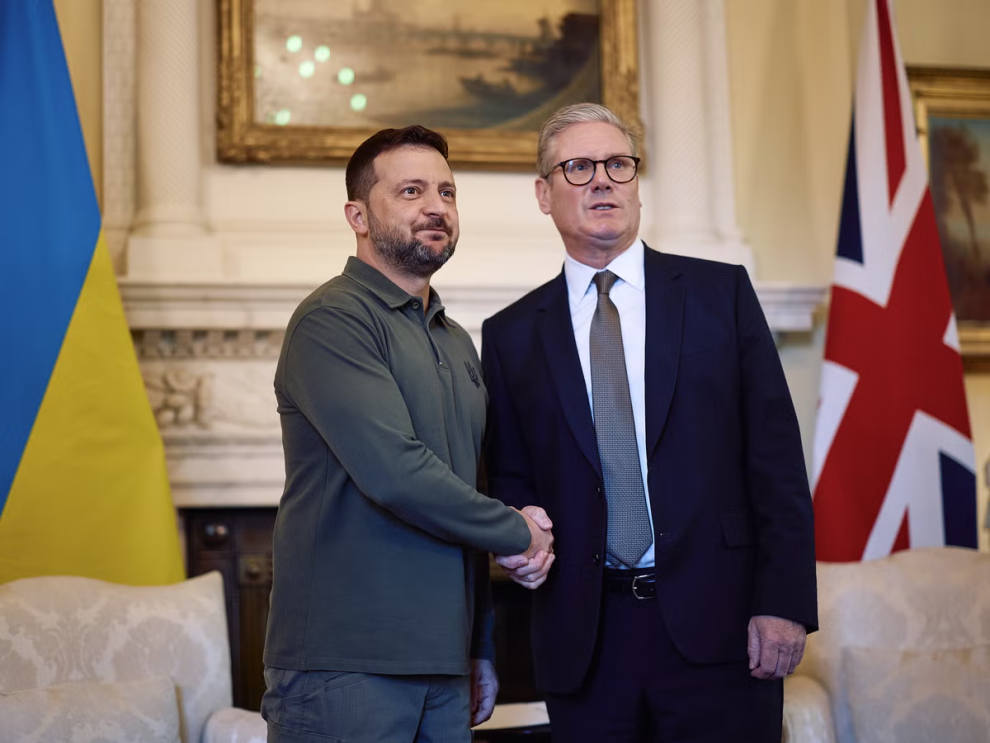PRIME MINISTER Sir Keir Starmer has asserted that a “US security guarantee” is the only viable path to securing peace in Ukraine. Speaking in Paris following an emergency summit with European leaders, he stressed that a “US backstop” is crucial to deterring any future aggression from Russia.
Sir Keir warned that Ukraine’s future was not the sole issue at stake, describing the situation as an “existential question for Europe as a whole” and therefore vital to Britain’s national interests. “This is a once-in-a-generation moment for the collective security of our continent,” he said.
Highlighting a “new era” in global politics, the prime minister stated that nations “cannot cling hopelessly to the comforts of the past.” He emphasised that any peace agreement must “safeguard Ukraine’s sovereignty” and prevent Russian President Vladimir Putin from launching further aggression.
Emergency Talks in Paris
The prime minister joined leaders from France, Germany, Italy, Poland, Spain, the Netherlands, Denmark, and the European Union at the Élysée Palace, alongside NATO Secretary General Mark Rutte. The meeting was called by French President Emmanuel Macron in response to Donald Trump’s unexpected decision to arrange direct talks between the US and Russia, excluding European nations and Ukraine. These discussions are set to commence in Saudi Arabia on Tuesday.
Despite this diplomatic manoeuvre, Sir Keir insisted that “Europe must play its role” and indicated a willingness to commit British forces as part of a long-term peace settlement. “I’m prepared to consider committing British forces on the ground alongside others if there is a lasting peace agreement,” he said. He also confirmed plans to visit Washington next week to meet President Trump and discuss “the key elements of a lasting peace.”
Reassuring European allies, Sir Keir stated, “It is clear the US is not going to leave NATO. But we Europeans will have to do more. The issue of burden-sharing is not new, but it is now pressing, and Europeans will have to step up, both in terms of spending and the capabilities we provide.”
The prime minister also confirmed continued engagement with Ukrainian President Volodymyr Zelenskyy, saying, “I spoke to President Zelenskyy on Friday. I will do so again in the coming days. And we envisage further engagement with European colleagues when I return from the US.”
European Leaders Divided on Troop Deployment
Despite three hours of discussions, European leaders left Paris without reaching a consensus on deploying peacekeeping troops to Ukraine. German Chancellor Olaf Scholz dismissed the idea as “completely premature,” stating that “it is completely the wrong time to have this discussion.” He also warned against making decisions without Ukraine’s involvement, emphasising that European states should only increase defence commitments if that is their collective will.
Denmark’s Prime Minister Mette Frederiksen echoed this cautious stance, acknowledging that while her country was “open to discussing many things,” the prospect of deploying Danish troops to Ukraine remained distant.
Trump’s Diplomatic Shockwave
Donald Trump’s decision to hold direct talks with Vladimir Putin, bypassing European leaders and Ukraine, has left many scrambling to reassess their security strategies. The move has raised concerns that Europe may need to take greater responsibility for its own defence amid waning US involvement.
When asked by Sky News’ Europe correspondent, Adam Parsons, whether Trump’s decision had undermined the UK, Europe, and Ukraine, Sir Keir responded that the US also sought “lasting peace,” as did Ukraine. However, he reiterated the necessity of a “US backstop” to support any security guarantees.
Britain, he affirmed, will “take a leading responsibility, as we always have,” adding that “democracy must prevail.”













